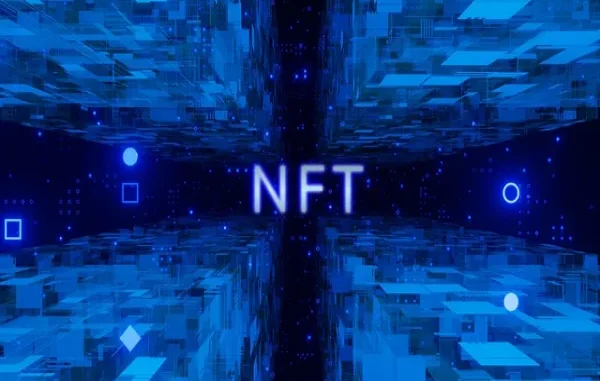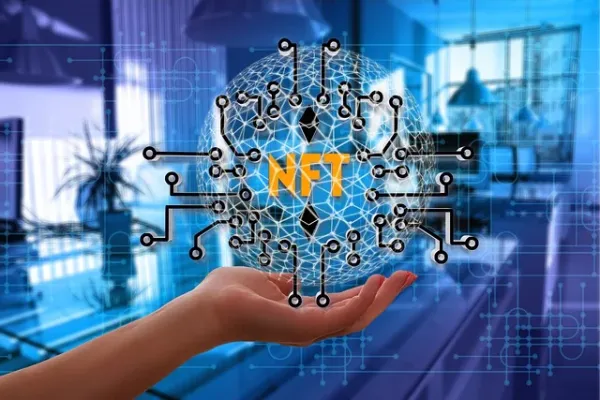
We dive deep into the world of NFTs, exploring their potential, risks, and considerations to help you make informed decisions. In this article, we answer the question: Is it safe to invest in NFTs?
Non-fungible tokens (NFTs) have exploded onto the scene, captivating the art world, digital collectibles market, and the investment landscape. Images, videos, music, and even tweets are being sold for staggering sums, sparking curiosity and a burning question: is it safe to invest in NFTs?
What are NFTs?
NFTs represent a paradigm shift in digital ownership. Unlike fungible tokens like Bitcoin (where one unit is identical to another), each NFT is unique and irreplaceable. It’s a digital certificate stored on a blockchain, a secure, distributed ledger, verifying ownership of a specific digital asset. This technology allows artists, creators, and even celebrities to tokenize their work, creating a verifiable and tradable asset.
What Can Be Represented by NFTs?
The ability to tokenize assets through NFTs extends far beyond the digital realm. Here’s a glimpse into the vast array of items that can be represented by NFTs:
- Digital Creations: Images, drawings, sketches, GIFs, videos, music tracks, and even video game items can all be transformed into NFTs, allowing ownership and monetization of digital content in a novel way.
- Tangible Treasures: The physical world isn’t left behind. Paintings, sculptures, rare wines, sports memorabilia, and even high-value assets like cars and airplanes can be tokenized, potentially streamlining ownership transfer and verification.
- Experiences and Access: NFTs can also represent access to exclusive experiences or reservations at coveted events. Imagine owning an NFT that grants you VIP access to a concert or a limited-edition ticket to a sporting event.
- Real Estate and Beyond: The potential of NFTs extends to real estate, fractionalizing ownership of buildings or houses, and even to companies, allowing for innovative investment opportunities in previously illiquid assets.
The Enticing Potential of NFTs
The NFT market holds undeniable allure for several reasons:
- Supporting Creators: NFTs empower creators to monetize their work directly, fostering a new revenue stream and potentially fairer compensation compared to traditional channels.
- Owning a Piece of History: NFTs can represent iconic moments or digital artifacts, offering a unique way to own a piece of the internet’s history.
- Investment Potential: The rapid rise of the NFT market has created a potential for significant returns, attracting investors seeking high-growth opportunities.
- Community and Exclusivity: NFTs can grant access to exclusive communities or experiences, fostering a sense of belonging and privilege for collectors.
The Advantages of NFTs
The rise of NFTs has ignited excitement for a multitude of reasons. Here are some key advantages that are reshaping the way we interact with digital assets and beyond:
- Democratizing Investment: NFT markets boast global reach, creating a potentially infinite pool of buyers. This can significantly boost the value of an NFT with a limited supply. Essentially, anyone with an internet connection and basic knowledge of NFT marketplaces can participate in this new investment landscape.
- Portable and Permanent Proof of Ownership: NFTs act as secure digital certificates, verifiable on applications and websites. This eliminates the need for physical contracts, streamlining the process of documenting ownership. Imagine instantly creating, verifying, and transferring ownership through a secure electronic contract, cutting out the need for lawyers and reducing the time and costs associated with traditional contract management.
- Unbreakable Evidence: NFTs leverage the power of blockchain technology, a tamper-proof digital ledger. This ensures ownership of an NFT is easily verifiable and significantly harder to contest in court.
- Fractional Ownership Revolution: NFTs unlock a new era of fractional ownership. Valuable assets can now be efficiently divided into smaller units and traded on dedicated marketplaces. This improves overall market liquidity and creates alternative avenues for crowdfunding. Traditionally, raising and distributing equity has been a complex process riddled with paperwork and communication hurdles. NFTs offer a streamlined and transparent alternative for equity financing, although regulations regarding their use as securities are still evolving.
The Risks and Uncertainties of a New Frontier
However, the NFT landscape is still young and comes with inherent risks:
- Market Volatility: The NFT market is highly volatile, with prices fluctuating significantly. Investing in NFTs carries a high degree of risk, and there’s no guarantee of future value.
- Bubble Concerns: The rapid price increases raise concerns of a potential bubble. If the market corrects, values could plummet, leading to significant losses.
- Technical Challenges: The technology underlying NFTs is still evolving, and there are concerns about security breaches and the long-term viability of certain blockchain platforms.
- Environmental Impact: Cryptocurrency transactions, including NFT minting, can consume significant energy. This raises environmental concerns for environmentally conscious investors.
- Lack of Regulation: The NFT market is largely unregulated, leaving investors vulnerable to scams and fraudulent activity.
Potential Drawbacks of NFTs
While NFTs offer exciting possibilities, it’s crucial to acknowledge the potential drawbacks associated with this nascent technology:
- Uncharted Regulatory Territory: Currently, NFTs operate in a largely unregulated space, with minimal investor protection and established investment laws. This lack of oversight can lead to market manipulation and fraudulent activity, with misinformation and speculative hype driving inflated prices, extreme volatility, and pump-and-dump schemes.
- Fraudulent Activity and Security Concerns: Anyone can create NFTs and online marketplaces, creating fertile ground for criminals to exploit unsuspecting buyers and sellers. The remote nature of NFT transactions makes it difficult to verify the authenticity of physical assets linked to NFTs and ensure compliance with anti-money laundering (AML) regulations. This is particularly concerning for high-value assets like fine art and luxury goods, where determining genuineness and legitimate provenance can be challenging. Protecting yourself requires verifiable documentation of the asset’s origin, the seller’s identity, and the marketplace’s legitimacy to avoid fraudulent replicas, hoaxes, or illicit transactions.
- Limited Legal Scope: While NFTs provide ownership documentation and evidence in disputes, they don’t offer complete protection against challenges and piracy. They don’t grant patents, trademarks, or override copyright laws. Third parties can still contest ownership, duplicate the asset, and sell replicas. This is especially worrisome for digital assets like images and videos, easily copied and distributed with minimal effort, leaving them vulnerable to intellectual property theft and infringement.
- Security Burden on Users: NFT security largely rests on your shoulders, unless purchased through a reputable custodian. Proper storage, unlocking, and management of public and private keys within your NFT wallet is a complex and time-consuming process. Mistakes can lead to permanent loss of access due to hacking or technical glitches. Additionally, the public transparency of blockchain transactions diminishes privacy and can make NFT holders susceptible to malware attacks.
- Dual Investment Considerations: The value of an NFT is intrinsically linked to, yet distinct from, the value of the underlying asset. You need to carefully evaluate both the investment fundamentals of the underlying asset and the economic characteristics of the NFT itself. Intangible, digital-only assets generally hold less intrinsic value compared to tangible, physical items.
Investing in NFTs: A Calculated Approach
So, is it safe to invest in NFTs? The answer, like most things in life, is “it depends.” Here are some key considerations:

- Do Your Research: Thoroughly research the NFT project you’re considering. Understand the creator, the utility of the NFT, and the underlying community.
- Invest What You Can Afford to Lose: The NFT market is unpredictable. Only invest what you’re comfortable potentially losing entirely.
- Diversify Your Portfolio: NFTs should not be the sole focus of your investment strategy. Consider them a high-risk, high-reward asset class within a broader diversified portfolio.
- Be Wary of Hype: Don’t get caught up in the hype surrounding certain NFTs. Make informed decisions based on your research and risk tolerance.
- Understand the Technology: It’s beneficial to have a basic understanding of blockchain technology and how NFTs work before investing.
Weighing the Investment Potential of NFTs
The NFT market has captured the attention of venture capitalists, with prominent firms like Andreessen Horowitz and Paradigm investing millions into this new asset class. However, before diving in, it’s crucial to understand not just the mechanics of NFTs, but also the rationale behind any potential purchase.
While headlines showcase record-breaking sales, like the $2.9 million fetched by Twitter CEO Jack Dorsey’s first tweet or the $70 million paid for a collection of digital artwork by Beeple, it’s important to maintain perspective. Unlike traditional assets like stocks, which derive value from a company’s performance, NFTs often lack an underlying asset. Their worth hinges solely on the whims of the market and the ever-shifting tides of supply and demand. In simpler terms, an NFT is only worth what someone is willing to pay for it at that specific moment.
Why People Are Drawn to NFTs
The NFT market is abuzz with activity, fueled by a variety of investor motivations:
- Owning a Piece of the Action: Some investors are primarily interested in acquiring the underlying asset itself, whether it’s a digital artwork, a collectible, or a piece of virtual real estate. NFTs provide a secure and verifiable way to claim ownership.
- The Tokenization Advantage: Beyond the underlying asset, some investors see value in the tokenization process itself. NFTs represent a new way to own and manage digital assets, offering potential benefits like divisibility, enhanced liquidity, and streamlined ownership verification.
- Exploring the Blockchain Frontier: For some, investing in NFTs is a gateway to exploring the world of cryptocurrency and blockchain technology. It allows them to participate in this evolving space and gain firsthand experience with its applications.
Beyond the Investment: The Future of NFTs
While the investment potential of NFTs remains uncertain, their impact on various industries is undeniable. They offer new ways to support creators, authenticate digital assets, and engage with communities.
The future of NFTs may lie not just in speculation, but in their broader application. Imagine concert tickets that double as exclusive artwork, academic credentials stored securely on a blockchain, or virtual real estate ownership in online worlds.
NFTs and the Environmental Cost
The environmental impact of cryptocurrency has become a growing concern, and NFTs are no strangers to this critique. A significant factor lies in the underlying technology: many NFTs rely on blockchains that utilize a process called “proof-of-work” for transaction verification. This method requires miners to solve complex mathematical problems using powerful computers, and the immense energy consumption to fuel these operations translates to a large carbon footprint.
Studies suggest that Bitcoin mining alone may use as much energy as an entire country. As the popularity of NFTs surges, so too does the energy demand, raising environmental red flags and sparking criticism from environmental groups.
The Copyright Conundrum: NFTs and Artistic Ownership
The ease with which NFTs can be created presents a challenge for artists. Because anyone can “mint” an NFT, there’s a vulnerability to theft. An artist’s work can be stolen and sold as an NFT without their knowledge or consent.
This lack of inherent copyright protection within the NFT creation process itself necessitates thorough due diligence by investors. Imagine unwittingly spending a hefty sum on a fake Banksy NFT – a scenario easily avoided by verifying the authenticity and ownership rights associated with an NFT before investing.
The Verdict: Invest with Caution, Embrace Innovation
Is it safe to invest in NFTs? There’s no simple answer. It’s a high-risk, high-reward proposition requiring careful research and a calculated approach. However, the underlying technology and its potential applications in various fields are undeniably intriguing.
By approaching NFTs with caution but embracing their innovative potential, you can navigate this new frontier with a keen eye and a well-informed perspective. Remember, the journey of any groundbreaking technology is rarely smooth, but the possibilities it unlocks can be transformative.

Leave a Reply